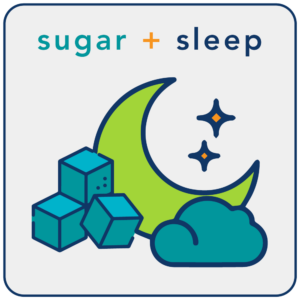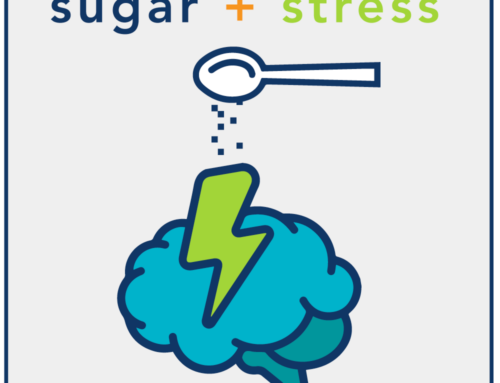What Affects Your Blood Glucose? Part 4 of 4: Sleep
Ahhhh, sleep. The time of night we dreaded as a child, always afraid of missing out on all the fun the grown ups were having while we were asleep. Well, now we are adults and 50 to 70 million of us have some sort of sleep disorder and 40% of us report falling asleep in the middle of the day at least once a month according to the National Institute of Health.

Many don’t realize so it is important to know that sleep plays a significant role in regulating blood sugar levels. Sleep and blood sugar are interconnected, meaning that both factors can influence each other. Here’s how sleep can affect blood sugar levels:
- Glycemic Control: Studies have shown that inadequate sleep can lead to impaired glycemic control (the body’s ability to maintain blood glucose levels within an optimal range), leading to higher blood sugar levels.
- Hormone Regulation: Sleep is involved in the regulation of various hormones, including cortisol, which is released in response to stress. Elevated cortisol levels, often associated with poor sleep, can contribute to higher blood sugar levels. Additionally, lack of sleep can lead to imbalances in other hormones like ghrelin and leptin, which can affect appetite and potentially lead to overeating and weight gain, further impacting blood sugar control.
- Insulin Sensitivity: Adequate sleep is crucial for maintaining insulin sensitivity. Poor sleep or insufficient sleep can lead to reduced insulin sensitivity, making it harder for cells to respond to insulin and causing higher blood sugar levels and higher insulin levels.
- Liver Function: During sleep, the liver plays a role in regulating blood sugar levels by storing and releasing glucose as needed. Disrupted sleep patterns can interfere with this process, potentially causing higher overnight blood sugar levels.
On the other hand, blood sugar levels can also influence sleep:
- High blood sugar before bed: This can affect your nervous system, making it hard to fall asleep which then can cause an increase in cortisol and adrenaline causing insomnia and preventing your body from fully relaxing.
- Frequent Urination: High blood sugar levels can lead to increased thirst and frequent urination, which can disrupt sleep by causing individuals to wake up multiple times during the night.
To promote better blood sugar control through sleep:
-
- Prioritize Sleep: Aim for 7-9 hours of quality sleep each night. Coaching note, your ability to fall asleep, starts with your habits in the morning, not just an hour or so before bed.
- Maintain a Regular Sleep Schedule: Try to go to bed and wake up at the same time every day to regulate your body’s internal clock. Coaching note, this includes the weekends as much as possible.
- Create a Sleep-Friendly Environment: Keep your bedroom dark, quiet, and at a comfortable temperature. Coaching note, Black out shades or curtains, soft “white noise” and a fan or cooling mattress pad can all help create a better sleep environment.
- Limit Screen Time: Reduce exposure to electronic devices with blue light before bedtime, as blue light can interfere with the production of melatonin, a hormone that regulates sleep. Coaching note, if this is tough, consider a pair of night time blue light blocking glasses.
- Practice Relaxation Techniques: Engage in relaxation techniques like meditation, deep breathing, or yoga to reduce stress and promote better sleep. Coaching Note: See the last email about stress.
- Limit Stimulants: Avoid caffeine and large meals close to bedtime, as they can interfere with sleep. Coaching Note: many find caffeine within 5-6 hours of bedtime disruptive and others find anytime past noon to be a problem. It’s worth testing on yourself.
- Avoid Alcohol right before bed: Later in the night, as alcohol levels drop, your brain kicks into overdrive. You may toss and turn as your body undergoes a rebound arousal. Coaching note: Alcohol right before bed does not put you to sleep. It “knocks you out” which is a different state altogether and in no way restorative.
- Stay Active: Regular physical activity can help improve sleep quality and blood sugar control. Coaching note: Remember all movement counts!
- Get exposure to sunlight throughout the day: exposure to sunlight throughout the day helps regulate your circadian rhythm and certain hormones that affect your ability to fall asleep and stay asleep. Coaching note: A walk in the morning, then again after dinner can help your body naturally adjust its circadian rhythm.
Working on the habits and the environment for better sleep is a great use of your coaching sessions if you are working with Simplex. It’s worth taking stock of your normal daily habits from what you tend to do from the minute you wake up to the minute you go to bed and look for patterns. What parts of your daily routine might be disrupting your sleep and where can you build a new habit that will elicit better sleep?



